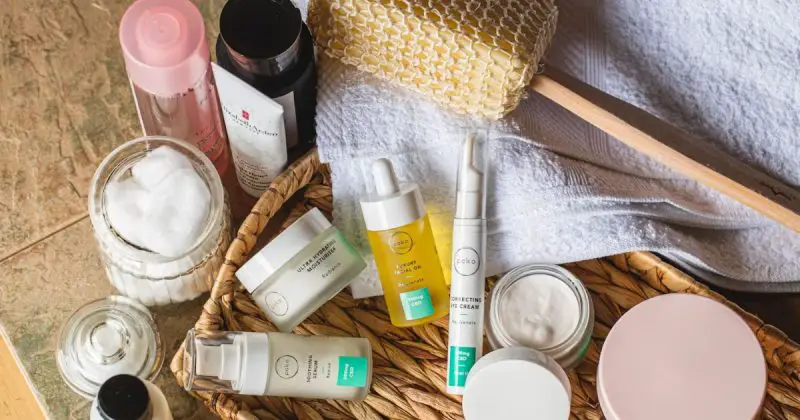Achieving healthy, glowing skin is a common goal, but the journey can feel overwhelming with many products, routines, and mixed advice. With the overwhelming number of skincare ingredients available today, it’s easy to feel confused about which ones are essential for your skin. While the effectiveness of different skincare products can depend on your skin type and concerns, several key ingredients are universally beneficial. Whether dry, oily, combination or sensitive skin type, these ingredients can support a smoother, more radiant complexion. Below, we’ll break down the most important skincare ingredients, explaining how they work and which skin types they’re best suited for.
Top 9 Skincare Ingredients for Radiant and Healthy Skin
1. Hyaluronic Acid
Hyaluronic acid (HA) is one of the most praised skincare ingredients due to its remarkable ability to retain moisture. Hyaluronic acid, naturally found in the skin, helps attract and retain moisture, leaving your complexion hydrated, plump, and smooth. Its ability to hold up to 1000 times its weight in water makes it particularly beneficial for dry skin. However, HA works well for all skin types—not only does it deeply hydrate, but it also enhances elasticity, helping to smooth fine lines and reduce the look of wrinkles.
For dry skin, hyaluronic acid acts as a humectant, drawing moisture from the environment into the skin and helping to restore hydration balance. HA provides the necessary humidity for oily or combination skin without adding excess oil or causing breakouts, making it a versatile option for any routine. It also enhances skin texture, helping to create a smoother, more youthful-looking complexion. Consistent use of hyaluronic acid-based products can help to maintain optimal hydration levels in the skin, making it a must-have in any skincare regimen.
Use a hyaluronic acid serum or moisturizer after cleansing to lock in moisture. To maximize its hydrating effect, it’s best used when the skin is damp.
2. Vitamin C
Vitamin C is a powerful antioxidant that helps shield the skin from environmental damage. Known for its ability to brighten the complexion, reduce pigmentation, and prevent premature aging, vitamin C should be part of any skincare routine, especially for those with dull or uneven skin tone. It neutralizes free radicals—unstable molecules that cause oxidative stress—helping to protect the skin from pollution, UV damage, and other environmental aggressors.
In addition to its protective role, vitamin C stimulates collagen production, making it essential for maintaining skin elasticity and firmness. For individuals concerned with pigmentation, dark spots, or sun damage, vitamin C can help to fade hyperpigmentation and promote an even skin tone. It’s particularly beneficial for those who experience a lack of radiance or have sun-damaged skin, but anyone looking to protect their skin from future damage can also benefit.
How to Use: After cleansing in the morning, apply a few drops of vitamin C serum to your face before moisturizing and applying sunscreen. It should be followed by sunscreen to enhance its protective effects against UV rays.
3. Retinol (Vitamin A)
Retinol, or Vitamin A, is a skincare powerhouse that helps tackle multiple skin concerns, from acne to fine lines and wrinkles. Retinol works by increasing cell turnover, which speeds up the shedding of dead skin cells and the regeneration of new, healthy skin. This process helps to improve skin texture, reduce the appearance of wrinkles, and even fade dark spots.
For those with acne, retinol can prevent pores from clogging with dead skin cells and excess oil, reducing breakouts over time. When used consistently, retinol also encourages the production of collagen, a protein that keeps the skin firm and youthful. However, due to its potency, retinol should be introduced slowly into your routine, especially if you have sensitive skin, as it can initially cause dryness, redness, and irritation.
How to Use: Start with a low concentration of retinol (0.25% or 0.5%) and apply it at night, gradually increasing the frequency. Follow with a moisturizer to reduce dryness, and always use sunscreen during the day to protect the skin from sun sensitivity.
4. Niacinamide (Vitamin B3)
Niacinamide, also known as Vitamin B3, is an incredibly versatile ingredient that works well for various skin types, particularly sensitive or redness-prone skin. It helps to calm irritation, reduce inflammation, and minimize the appearance of pores. Niacinamide also strengthens the skin’s barrier, which is essential for keeping moisture in and irritants out, helping to protect the skin from environmental damage.
One of niacinamide’s most significant benefits is its ability to even out skin tone and improve overall skin texture. For individuals with hyperpigmentation, niacinamide can help reduce the appearance of dark spots, age spots, and sun damage, giving the skin a more uniform tone. This ingredient benefits those with acne-prone skin because it helps reduce redness and irritation often associated with breakouts.
How to Use: Niacinamide can be used both in the morning and at night. It’s typically found in serums, moisturizers, or toners and can be layered with other active ingredients for maximum benefit.
5. Peptides
Peptides are small chains of amino acids that support the skin’s natural repair processes by encouraging collagen and elastin production. These proteins are essential for maintaining the skin’s firmness, elasticity, and smooth texture. Our natural collagen production slows down as we age, leading to sagging skin, fine lines, and wrinkles. Peptides help reverse this process by signaling to the skin to produce more collagen, improving strength and elasticity.
In addition to their anti-aging benefits, peptides promote the skin’s natural repair processes. They help heal damaged skin and support the skin’s barrier, making them an excellent option for anyone with compromised skin or those dealing with environmental damage. Whether you aim to maintain youthful-looking skin or reduce signs of aging, peptides are a valuable addition to your skincare routine.
How to Use: Look for serums, moisturizers, or creams that contain peptides. They can be used both morning and night and are typically well-tolerated by all skin types.
6. Sunscreen (SPF 30 or Higher)
Sunscreen is undeniably the most critical step in any skincare routine, and for good reason. Sun exposure is a major contributor to premature aging, hyperpigmentation, and an increased risk of skin cancer. Protecting your skin from harmful UV rays is essential to prevent these issues and maintain overall health.
SPF 30 or higher provides sufficient protection for most skin types, but those with fair or sensitive skin may benefit from a higher SPF. Sunscreen should be applied every morning, even on cloudy days, as UV rays can penetrate the clouds. In addition to preventing sunburn, sunscreen helps protect the skin from photoaging, including wrinkles, sagging, and age spots caused by UV exposure.
How to Use: Apply a generous amount of sunscreen as the last step in your morning routine. To ensure continuous protection, reapply sunscreen every two hours when outdoors and immediately after swimming or sweating.
7. Alpha Hydroxy Acids (AHAs)
AHAs, including glycolic and lactic acids, are chemical exfoliants that help slough off dead skin cells, revealing a smoother, more radiant complexion. These acids dissolve the bonds between dead skin cells, allowing them to be shed more easily. This leads to enhanced skin texture, tone, and overall radiance.
AHAs are especially helpful for dull, dry, or uneven skin tones. Exfoliating dead skin cells promotes a brighter, more radiant complexion. Additionally, AHAs help reduce the appearance of fine lines, wrinkles, and age spots. For those dealing with sun damage or hyperpigmentation, AHAs can visibly improve dark spots and uneven pigmentation.
How to Use: Use AHA-containing products, such as serums, toners, or masks, after cleansing. Start with lower concentrations to avoid irritation and gradually increase usage as your skin builds tolerance.
8. Salicylic Acid (BHA)
Salicylic acid, a beta-hydroxy acid (BHA), is particularly effective for oily and acne-prone skin. Unlike AHAs, salicylic acid is oil-soluble, allowing it to penetrate deep into the pores and dissolve excess oil and impurities that can cause acne and blackheads. It’s especially helpful for those dealing with clogged pores, blackheads, and breakouts.
In addition to clearing pores, salicylic acid has anti-inflammatory properties that help calm acne flare-ups and reduce redness. For those with oily skin, salicylic acid helps to control sebum production, preventing the excess oil that can lead to acne. Salicylic acid should be a cornerstone of your skincare routine to avoid or treat breakouts.
How to Use: Salicylic acid is typically found in cleansers, toners, and spot treatments. Apply it after cleansing and before moisturizing. Start with products containing lower concentrations of salicylic acid (1–2%) to avoid irritation.
9. Ceramides
Ceramides are essential lipids (fats) that make up the skin’s natural barrier. They help lock in moisture and protect against environmental stressors. This barrier prevents dehydration and shields the skin from harmful factors like pollution, extreme weather, and bacteria. Over time, ceramide levels can decrease, leading to dryness, sensitivity, and irritation.
Replenishing ceramides strengthens the skin’s barrier, improving its ability to retain moisture and defend against external irritants. Ceramides are particularly beneficial for dry, sensitive, or compromised skin, as they help restore hydration and alleviate irritation. Ceramides are crucial for maintaining healthy skin for conditions like eczema, rosacea, or other issues that weaken the skin’s barrier.
How to Use: Ceramides are commonly found in moisturizers, creams, and lotions. After applying your serum, use a ceramide-based product to seal in moisture and reinforce your skin’s protective barrier.
Building a Skincare Routine for Glowing, Healthy Skin
Understanding these essential skincare ingredients and their benefits can help you build a routine that suits your unique skin needs. Each ingredient is vital for glowing, healthy skin, from hydration and protection to anti-aging and exfoliation. While finding the perfect combination of products for your skin may take time, integrating these tried-and-true ingredients into your routine is a great place to start.
Consistency is key; the best skincare results come with patience and regular care. By focusing on the essential ingredients that support your skin’s health, you can create a skincare routine that leaves you glowing, radiant skin for years.





